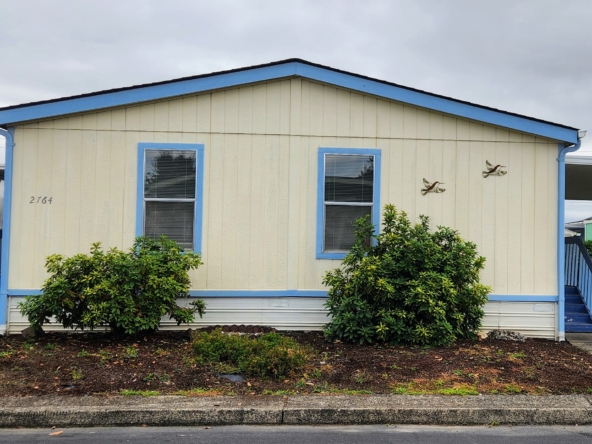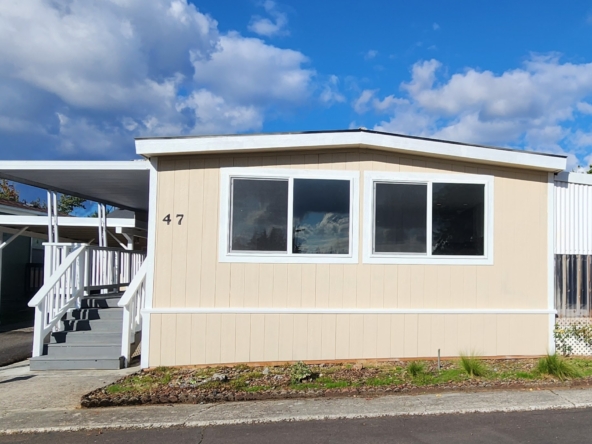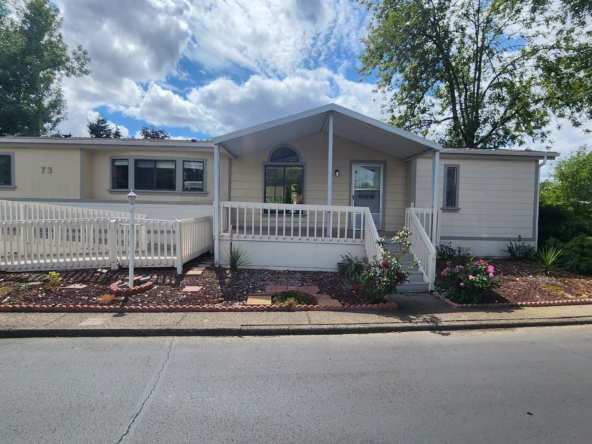Read a few of our frequently asked questions below to learn more about buying, and renting.
Buying
There are many factors for a home install that make each project different. SDC fees, permits, site construction, and labor. For example, putting a triple-wide home on a sloped parcel of land with no sewer or water connections requires a lot more construction than placing a single wide on a flat parcel with an already existing sewer and water connection. Labor costs near large cities are variable compared to rural areas. Sales tax may also play a role depending on where the home will be delivered.
We provide pricing for the home only as consumers may want to facilitate the full installation on their own. We certainly can help you coordinate other vendors for a full installation. Email us to figure out your project [email protected]
We have much lower overhead costs.
Why?
Other dealers have 10-20 homes per lot which could be as much as $4 million PER LOT. There are costs to buy the home, transport to the Dealer’s Lot, interior close-up, carpet, temporary steps, cleaning, interior staging and utilities. All of those costs get passed on in some way to the consumer. Therefore by not having a lot and no aging homes allows us to be factory to the final destination which can save thousands of dollars on your end price.
Park owners have been keen on the discount savings we provide. We have sold and placed hundreds of homes in communities as infill and built new communities.
SDC fees (System Development Charges) are fees the local jurisdiction charges to maintain or expand public utilities. For example, when you hook your home up to the local water or sewer your home contributes to the public pipes underground. Every time you take a shower, flush the toilet, or drive on public roads that cause wear and tear. The fees are used to help build new systems as the population grows and urban sprawl expands larger. These fees can be above $12K-$40K per home depending on the area.
If however there was a home already placed on a lot, they may have already paid those fees some time ago and you will be exempt from paying those fees if you decided to replace the previous home.
Example fees are
- Water
- Sanitary Sewer
- Storm Sewer
- Transportation
- School
- Park
- Construction excise tax
- Specialty fees
Factory construction takes 4-6 months from the time of order.
Once the home has left the factory the full construction process can vary in duration. The time can vary based on contractor availability and weather but generally can take 3 1/2- 4 1/12 months for the home to be fully completed out on site.
I want to buy a new home. What next?
- Figure out a budget. How much down payment do you have? Typically the it’s 40-50% up front for the factory to start building your home. Lending institutions have certain criteria for loans; Credit scores, income, and down payment minimums are all used in the underwriting process.
- If you need financing, you may reach out to one of our partners, Financial Services Unlimited 1-800-238-9202, or email [email protected]. They can help get you a free pre-approval letter in that you can use to purchase any house
- A conventional (loan for a regular site-built home) is not the same as a manufactured home and will not carry over equivalently. Large banks like Wells Fargo, Bank of America, etc., no longer originate manufactured home loans for in-park or new construction.
- To get a loan for in park, you will need to pick a base home for your loan application. It does not matter if the home you select gets sold or if that is not the actual home you want to be in. This process will allow you to get your pre-approval letter, which you can use on the actual home you like. You will be able to close MUCH quicker than other buyers to secure the home of your dreams.
- To get a home on land you’ll want to get approved wit ha lender that focus in manufactured home construction loans. Reason being is many lenders stopped providing construction loans for manufactured homes.
Putting a home on private land
- Research parcels that you are interested in buying
- Figure out a budget
- Look for what the property is zoned as, what are the SDC fees (If applicable), where are utilities and roads in relation to where the home will go, records of prior structures on the lot, any issues with the title on the property, the topography of the parcel (Is it flat, are there any streams, etc.), is there a well and septic and if so what size of the home is it approved for?
- Understand your budget and understand if you need financing, if so, how much. Research methods for acquiring the land, cash, or loan? Will you wrap the home cost in the loan, what about the cost of any construction and SDC fees?
- If the cost still meets your budget, pick a floor plan and reach out to a qualified sales agent to discuss your needs AND…… the fun part, designing your new home! 🙂
- If you are looking for a new home to your land, check out our floorplans by our manufacturers
- MH Village
- Senior Retirement Living
- Zillow
- Facebook Marketplace
- Craigslist
Financing
- Manufactured homes by themselves (No land) are considered personal property loans (Chattel), like a car, boat or RV loan. They have a higher interest rate than a traditional conventional mortgage. Because it is personal property you also only have to do a title transfer and not a deed transfer, which can save thousands of dollars in closing costs. The deed would be for selling the land and home. The title is just for the home.
From start to finish it usually takes around 30-45 days but can take longer. The timeline can change based on the company you go through, the submission and completeness of your documents, the time of year (holidays), etc.
No, there is no private mortgage insurance on manufactured home loans.
For all our home sales we have a sister company called Financial Services Unlimited to provide financing for manufactured homes. Typical requirements are
- Homes built during or after 1977
- 10% minimum down payment (down payment can be gifted from another)
Call them today to speak 1 on 1 with a specialist to figure out a program. Pre-approval letters are free of charge and put you days if not weeks ahead of other buyers in the purchase process.
Several factors go into your interest rate; examples are credit score, debt-to-income, down payment, and more. Rates across the US for chattel loans (Manufactured home loans without owning the land) are typically 2-4% higher than the traditional 30 mortgage rate. Loans for (Chattel) are a max of 20-25 years on existing and 25 years on new homes.
- Mobile Homes A mobile home is a home built pre-1976. Mobile homes could be built in a variety of ways (some unsafe or of very poor quality to consumers). Both in and out of the industry the term is used as a loosely derogatory synonym for all manufactured homes even though it is not correct.
- Manufactured Homes– After 1976 all homes have to be built to HUD code. The 1976 code was a uniform code that applied to all states for how manufactured homes need to be built no matter where you are in the country. This code has been revamped several times over the last 50 years to increase the quality of homes constructed. This code and several other laws have been written barring the local county or city from discriminating against the placement of these homes.
- Modular Homes– Modular homes are also built in a controlled environment like manufactured homes. Instead of being built to the national HUD code, they are built to the local code. For instance, the city or county you live in may have more regulations on how a home is built than the HUD code. Which can add more cost to be put into the project to build to the local specialty code. Modular homes are also built-in sections and shipped out to the site to be placed. Like a full pre-made kitchen that has just been inserted into a home.
General FAQ
When people hear of manufactured homes they think of tornadoes in the Midwest with a trailer flying around it or a flooded mobile home park in Louisiana. So these homes must be worse, right?
Mother nature will destroy or cause damage to anything in its path regardless if it is site-built or stick built. However, the Federal government made sweeping changes in the 1990s and early 2000s on home installation and construction, making them more sturdy and safe from the elements.
A 2013 study by the National Fire Protection Association (NFPA) indicated the fire safety code for manufactured homes is more stringent than the code for all other homes built on site. NFPA indicated today’s manufactured homes have 38-44 percent fewer fires and lower civilian fire injuries than site-built homes per 100,000 people.
FEMA (Federal Emergency Management Agency) reported in their research that Manufactured homes “performed much better than conventional residential framing.” in terms of flooding and wood rot from over a study of over 100,000 homes.
Manufactured homes are built with the same quality material as a site built home. The reason that they cost less is
- Manufactured homes are built in an indoor factory on an assembly line. Being in this environment keeps the weather, vandalism, and theft at bay. It is also a centralized location where the factory can buy materials in bulk, have trades come to one location to work, and have the work done in perfect order of events. This is highly efficient in cost and production time and incurs minimal waste. All these benefits allow the factories to sell products at lower prices.
- When buying a traditional home, usually the land on which the home resides accounts for the majority of the value, and the home and land come together. With manufactured homes, you buy the home from a dealer (Willamette Home), and you can place that on your own purchased property just like a traditional home.
Both site-built homes and manufactured homes depreciate. Over time, all structures have wear and tear due to use, weather, and time. No matter if it is a million-dollar home or a ten-thousand-dollar home. However, home value can be maintained in the structure by taking care of and updating the home. A 1920s home needs to have updated plumbing, electrical, a new roof, new siding, and probably upgraded interior to a more modern feel (Appliances, paint, carpet, etc) to retain its value. In addition, make sure you carefully consider location and community when choosing a home, as it can greatly affect the home’s future value. Manufactured homes can appreciate just like a traditional home. Much of it is due to market influences, how well the home is taken care of, and the location.
If you are in a newly (re)developed location, do some research on the construction of the surrounding area being developed to determine if it may affect your home.
In fact, the FHFA (Federal Housing Finance Agency) compiled data comparing manufactured homes to site-built homes. Guess what…..they appreciate roughly the same 3.4% vs 3.8%. The main difference was the location of the homes. Many urban areas have had high price appreciation but few manufactured homes, which skews the data, like San Francisco and Seattle. While places with lots of manufactured homes, like Louisiana, Alabama, and South Carolina, have lower population and abundant land allows modest price appreciation.
Like an apartment application, manufactured home communities have applications. Many follow a standard background check, credit report (Not just score but unpaid bills like rent, utility, car payments, etc.), employment history, financials, and rental history.
Approvals take 2 days to over a week, the faster your paperwork is submitted and the more complete it is will shorten your wait time. During the applications communities may ask for insurance, Financial Services Insurance can help provide an insurance quote, call (360) 504-2755
Keep this in mind when buying a home. Buying a home before park approval may put you in a pickle if you are denied
Family communities, also commonly called, All ages communities, are communities that simply allow all ages to reside.
Age-restricted communities are designed for seniors above 55+ plus to reside in. What this means is that the primary resident needs to be at least 55 years old. However, the owner of the home or another resident can still be in the park as long as the primary resident is above 55+. Always call the park management to get a copy of the
Are equivalent to an HOA’s (Home Owners Association) CC&Rs (Covenants, Conditions & Restrictions). This will help you in finding a community




